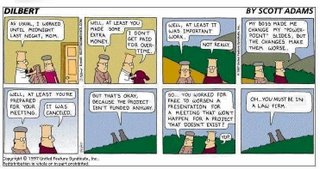
Friday, June 30, 2006
Senate to take up stem cell bills
 Sen. Majority Leader Bill Frist announced yesterday that he intends to bring up a three-bill package that would provide federal funding for stem-cell research for a vote before the Senate takes a break for the mid-term elections in October (according to the AP) or July (according to CNN, the Washington Post, and the Wall Street Journal).
Sen. Majority Leader Bill Frist announced yesterday that he intends to bring up a three-bill package that would provide federal funding for stem-cell research for a vote before the Senate takes a break for the mid-term elections in October (according to the AP) or July (according to CNN, the Washington Post, and the Wall Street Journal).Here's the summary of the Senate's unanimous-consent agreement on Frist's plan (from the Congressional Record's Daily Digest for June 29):
Stem Cell Research Legislation--Agreement: A unanimous-consent agreement was reached providing that at a time determined by the Majority Leader, after consultation with the Democratic Leader, Senate begin consideration en bloc of H.R. 810, to amend the Public Health Service Act to provide for human embryonic stem cell research, and S. 2754, to derive human pluripotent stem cell lines using techniques that do not knowingly harm embryos, and S. 3504, to amend the Public Health Service Act to prohibit the solicitation or acceptance of tissue from fetuses gestated for research purposes, that both bills be discharged from the Committee on Health, Education, Labor, and Pensions; that there be 12 hours of debate equally divided between the Majority and Democratic Leaders, or their designees; that no amendments be in order to any of the bills; that following the use, or yielding back of time, the bills be read a third time, respectively, and the Senate begin three consecutive votes on final passage of the bills in the following order: S. 3504, S. 2754, and H.R. 810; provided further, that any bill that does not receive 60 votes in the affirmative have its votes on passage be vitiated, and that those bills be returned to the calendar or to the Committee on Health, Education, Labor, and Pensions; and that it not be in order for the Senate to consider any bill or amendment relating to stem cell research during the remainder of the 109th Congress.
The action is set out at pp. S7169-S7173 of the Congressional Record for June 29.
Thursday, June 29, 2006
Is it legal to buy off manufacturers of generic equivalents?
 The FTC thinks it's unlawful for the manufacturer of a patented drug or device to include in the settlement of its suit against the manufacturer of a generic equivalent a cash payment in return for the generic manufacturer's pledge to withhold its product from market. [In the Matter of Schering-Plough Corporation, Upsher-Smith Laboratories, and American Home Products Corporation, Docket No 9297] The 11th Circuit disagreed. [Schering-Plough Corp. v. FTC, No. 04-10688, March 8, 2005] On Monday, the Supreme Court denied cert. [order list; Docket No. 05-273], at least in part because the Solicitor General told the Court that this wasn't a particularly good case to tee up the issue (according to observers like SCOTUSBlog and the AP), in part because a similar case is cooking over in the Second Circuit [from the SG's brief at 16: "Indeed, only a district court thus far has examined, and rejected, the view that a patent gives the holder merely a potential right to exclude infringing competitors from the market. In re Ciprofloxacin Hydrochloride Antitrust Litig. (Cipro-floxacin), 363 F. Supp. 2d 514, 531-533 (E.D.N.Y. 2005), appeal docketed, No. 05-2851 (2d Cir. June 7, 2005). The Second Circuit may address the validity of that theory in its consideration of that case. That prospect further counsels against plenary review at this juncture."]
The FTC thinks it's unlawful for the manufacturer of a patented drug or device to include in the settlement of its suit against the manufacturer of a generic equivalent a cash payment in return for the generic manufacturer's pledge to withhold its product from market. [In the Matter of Schering-Plough Corporation, Upsher-Smith Laboratories, and American Home Products Corporation, Docket No 9297] The 11th Circuit disagreed. [Schering-Plough Corp. v. FTC, No. 04-10688, March 8, 2005] On Monday, the Supreme Court denied cert. [order list; Docket No. 05-273], at least in part because the Solicitor General told the Court that this wasn't a particularly good case to tee up the issue (according to observers like SCOTUSBlog and the AP), in part because a similar case is cooking over in the Second Circuit [from the SG's brief at 16: "Indeed, only a district court thus far has examined, and rejected, the view that a patent gives the holder merely a potential right to exclude infringing competitors from the market. In re Ciprofloxacin Hydrochloride Antitrust Litig. (Cipro-floxacin), 363 F. Supp. 2d 514, 531-533 (E.D.N.Y. 2005), appeal docketed, No. 05-2851 (2d Cir. June 7, 2005). The Second Circuit may address the validity of that theory in its consideration of that case. That prospect further counsels against plenary review at this juncture."]Meanwhile, as reported by Modern Healthcare, four members of the Senate Judiciary Committee (Republican Chuck Grassley (press release) and Democrats Leahy (press release), Kohl (press release), and Schumer) have introduced "[a] bill to prohibit brand name drug companies from compensating generic drug companies to delay the entry of a generic drug into the market." See Cong. Rec. S6560 (June 27, 2006); see also S.3582 (referred to the Committee on Commerce, Science, and Transportation).
This issue bears close watching. It is a terrific combination of cost-quality-access issues, as well as a good introduction to the tactics of the drug and device industries.
Words of One Syllable Department
Wednesday, June 28, 2006
Drug & device manufacturers and docs: a new twist on an old tale
 Drug and medical device manufacturers have long struggled to devise ways to get tight with physicians who can promote, recommend, prescribe, or use their products. In recent years, PhRMA and the FDA have published guidelines to rein in marketing abuses. All that effort, and the reams of adverse news stories and other publicity, seems only to have intensified the industry's efforts to continue the remuneration to doctors, albeit in a manner that might escape detection or, once discovered, provide the industry with a better cover story than was possible when the emoluments took the form of all-expenses-paid trips to Hawaii.
Drug and medical device manufacturers have long struggled to devise ways to get tight with physicians who can promote, recommend, prescribe, or use their products. In recent years, PhRMA and the FDA have published guidelines to rein in marketing abuses. All that effort, and the reams of adverse news stories and other publicity, seems only to have intensified the industry's efforts to continue the remuneration to doctors, albeit in a manner that might escape detection or, once discovered, provide the industry with a better cover story than was possible when the emoluments took the form of all-expenses-paid trips to Hawaii. Judging from an article in today's N.Y. Times ("Charities Tied to Doctors Get Drug Industry Gifts," by Reed Abelson), the latest ploy seems not to have worked exactly as planned:
The Midwest Heart Foundation, and the way it has become quietly interwoven into its doctors' professional lives, is far from unique. Around the country, doctors in private practice have set up tax-exempt charities into which drug companies and medical device makers are, with little fanfare, pouring donations — money that adds up to millions of dollars a year. And some medical experts see that as a big problem.
The charities are typically set up to engage in medical research or education, and the doctors involved defend those efforts as legitimate charitable activities that benefit the public. But because they operate mainly under the radar, the tax-exempt organizations represent what some other doctors, as well as regulators and industry consultants, say is a growing conduit for industry money. The payments, they say, can bias the treatment decisions of physicians, may lead to suspect research findings and at times may even risk running afoul of anti-kickback laws.
Federal officials are starting to take notice of such tax-exempt charities, which critics say are becoming increasingly popular as other forms of industry support to physicians — like lucrative consulting agreements that involve little actual work — have come under scrutiny from regulators and others worried about the potential conflicts.



